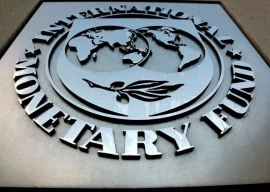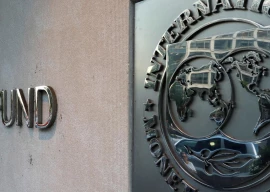
Finance Minister Muhammad Aurangzeb announced on Tuesday that Pakistan's foreign exchange reserves were projected to reach "anywhere between $9 to $10 billion" by the end of June.
Speaking at the opening session of the seventh 'Leaders in Islamabad Business Summit', he expressed confidence that the expected reserves would signify a significant improvement compared to the previous year.
Aurangzeb said that the country’s economy was steadily advancing in the right direction, underlining the government’s commitment to accelerate momentum towards achieving both economic growth and comprehensive social development.
In his address, the minister highlighted the impact of the incumbent government’s constructive measures on economic indicators, noting their resilience amidst challenges.
He emphasized that these indicators signify a favorable trajectory compared to previous standings, signaling an optimistic outlook for the economy.
He said that upon assuming power, the foreign exchange reserves of the country stood at $3.4 billion, an import bill covering only 15 days. However, he noted a significant improvement, with reserves now exceeding $8 billion. He further anticipated a boost following the International Monetary Fund’s (IMF) disbursement of the final tranche of $1.1 billion under the stand-by agreement signed in June 2023.
The minister added that the Pakistan Stock Exchange (PSX) was performing well as it witnessed remarkable growth during recent days. He said such sentiments were helping restore market confidence. Moreover, the agricultural sector in the country experienced notable growth with successful harvesting of bumper crops, promising a positive ripple effect on the industrial sector, he added.
The minister stressed the importance of promoting agriculture growth by up to five to six percent per annum, besides harnessing the potential of local livestock sectors.
Read Aurangzeb optimistic about larger bailout program from IMF
He highlighted the government’s proactive stance in fostering foreign direct investment within the country, citing recent engagements with various nations, including the Kingdom of Saudi Arabia. He expressed optimism regarding substantial future collaboration, anticipating vital involvement from Saudi Arabia in the days ahead.
The finance minister also expressed the government’s firm resolve to facilitate businesses in enhancing exports, adding the government also introduced structural reforms to turn around the economy to sustainable growth.
He said these reforms were home-grown and for the larger benefit of the economy and development. The government was focusing on the transformation of three key areas including tax, the energy sector, and reforms in state-owned enterprises (SoEs). He added that it intended to enhance tax to GDP ratio, which currently stands at nine percent.
In pursuit of higher growth, the government is actively enhancing tax enforcement measures, expanding the tax base, and tackling litigation issues head-on. The minister emphasized that by addressing enforcement and litigation matters, the government aims to resolve issues pertaining to over Rs1.7 trillion currently pending with tax authorities. He said the finance ministry was negotiating with the law ministry to streamline pending tax matters with different tribunals.
About his recent meetings with the IMF and other multilateral financial institutions and agencies, the minister said that discussions remained fruitful. He expressed hope that Pakistan would reach a staff-level agreement within the specified time frame as a delegation of the fund was due to visit by mid-next month.
The minister said the IMF programme was imperative to fulfill the country’s monetary requirements, adding that no one was forcing the government to carry out reforms rather these were for economic uplift and social development of the country.
Aurangzeb called for adopting a holistic approach to mitigate the adverse impact of climate change as Pakistan was among the most vulnerable countries and was facing uneven weather patterns more frequently now.
He said he also held discussions with the World Bank on climate change, digitization of the Federal Board of Revenue, and human capital development.
With additional reporting by APP


1732085354-0/insta-(1)1732085354-0-165x106.webp)

1725366721-0/kyle-(1)1725366721-0-165x106.webp)
1732085810-0/Copy-of-Untitled-(51)1732085810-0-270x192.webp)
1732084955-0/Untitled-design-(64)1732084955-0-270x192.webp)



1732011525-0/Express-Tribune-(8)1732011525-0-270x192.webp)









COMMENTS
Comments are moderated and generally will be posted if they are on-topic and not abusive.
For more information, please see our Comments FAQ